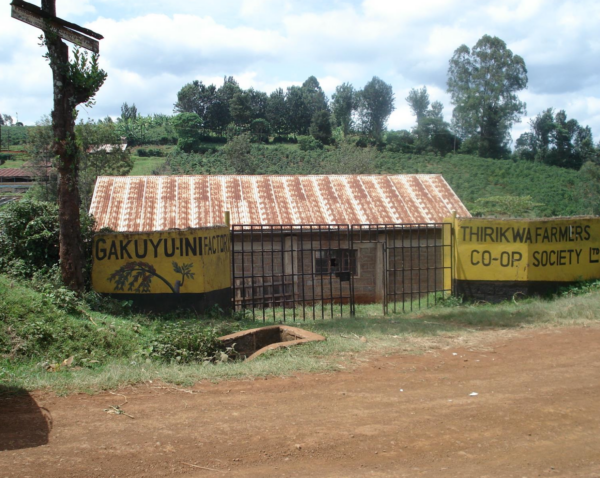About Gakuyu-ini AB
 Gakuyu-ini Factory is located in the Central Province of the Kirinyaga District, in the Ngariama region of Gichugu Division, near Kianyaga town of Kirinyaga County. It was built in 1982 and rests on a 2-acre plot.
Gakuyu-ini Factory is located in the Central Province of the Kirinyaga District, in the Ngariama region of Gichugu Division, near Kianyaga town of Kirinyaga County. It was built in 1982 and rests on a 2-acre plot.
The area experiences bimodal rainfall and temperatures ranging from 13-26 degrees Celsius. The primary rainy season lasts from March to May with a secondary rainy season between October and December. The region’s red fertile alluvial soils play a big role in the excellent cup quality that comes from this area.
The harvest area experiences a biennial production cycle with first harvest from April to June and second harvest from October to December. Farmers in this region grow mainly SL28 and SL34 varieties. Cherry production has risen over time due to improved coffee prices and an ideal climate for coffee production.
Fieldwork for factory staff involves sourcing planting materials, weeding, pruning, applying fertilizer, mulching, and offering technical advice through farmer training programs and field visits. On these visits, the field committee ensures farmers are following best-practice guidelines. They also check that coffee is intercropped with the right plants rather than the wrong ones (for instance, they don’t recommend intercropping with maize).
After harvest, all coffee is delivered same-day to the factory for immediate wet processing. Gakuyu-ini Factory pumps water from the neighboring Kiri river to the reservoir tanks for pulping and recirculation.
After pulping, the coffee is fermented overnight, washed, soaked and spread on drying tables. The parchment is then frequently turned on the drying tables, sorted, and stored awaiting delivery to the mill. To ensure that the processing is carried out efficiently, the factory has invested in a pulper, a recirculation system, and about 10 conditioning bins.
Gakuyu-ini Coffee factory has a factory manager with 10 permanent staffers and numerous seasonal workers who are hired as needed. The number of seasonal workers varies from year to year depending on harvest volume. During peak season, the factory employs around 30 seasonal workers. Off-peak, they retain about 2. Factory operations include weighing coffee, selection, coffee grading, soaking, washing, drying, sorting, paying farmers, and addressing farmers’ issues.
Kirinyaga County is located 2 hours from Kenya’s capital, Nairobi. It’s south of Mount Kenya, an extinct volcano and the second highest snow-capped peak in Africa (5,199 masl), after Kilimanjaro.
The presence of this snowy mountain in Kirinyaga (the name of which actually means “White Mountain” in the native Kikuyu language) plays a fundamental role for the communities and coffees of the surrounding areas. Its glaciers form the rivers, which are the main source of water for coffee processing. These glacier-fed rivers also help cool the surrounding areas, giving the farms in the county an annual temperature between 13 and 25 C, privileged temperatures compared to other coffee-growing areas in Africa.
The Ngariama area has a long chain of mountains that help provide a diversity of altitudes and terrain for coffee cultivation. While this could seem like an obstacle to access (as it is in Peru where the presence of Andes means getting to a farm can take 7+ hours by road), in Ngariama the farms are only about a 20 minute trail walk (1-2 km) from the washing stations. Only in the rainy season does access become complex as mud makes these unpaved trails challenging to navigate.
The entire Kirinyaga county has around 600,000 residents whose main economic pillar is coffee. Farmers also grow macadamia, bananas, corn, and in lower areas many raise cows for milk production.
Farms in this region are surrounded by forests of native trees where wild animals such as elephants and buffalos live. Local coffee producers use fences strategically along their farm perimeters to protect their crops and minimize contact with potentially dangerous fauna. The Kenyan government has prohibited logging and hunting in the area and producers are very respectful of these rules.
The predominant population of Kirinyaga are the Kikuyu, the oldest native population in the area which contains several tribes. Most people marry within their tribe. Everyone in the area speaks Kikuyu but the communities have small dialect differences.
The farms here are mostly very small (1-2 hectares) and adults work the farms while children attend school all day. Schools here cost money, which unfortunately limits access to education and future opportunities in this mostly-poor area. Due to lack of opportunity, much of the young population is migrating en masse to cities in search of better jobs, leaving their parents alone on the farms or even taking their parents and abandoning their farms. This problem gets worse each year. But some producers remain hopeful that coffee can provide good business opportunities for their children.


 Gakuyu-ini Factory is located in the Central Province of the Kirinyaga District, in the Ngariama region of Gichugu Division, near Kianyaga town of Kirinyaga County. It was built in 1982 and rests on a 2-acre plot.
Gakuyu-ini Factory is located in the Central Province of the Kirinyaga District, in the Ngariama region of Gichugu Division, near Kianyaga town of Kirinyaga County. It was built in 1982 and rests on a 2-acre plot.